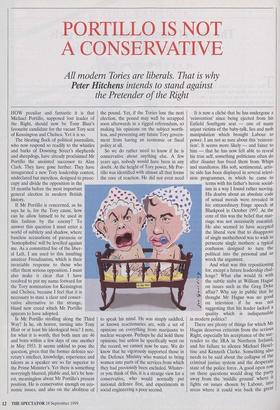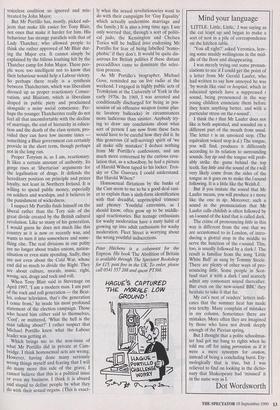PORTILLO IS NOT A CONSERVATIVE
All modern Tories are liberals. That is why
Peter Hitchens intends to stand against
the Pretender of the Right
HOW peculiar and fantastic it is that Michael Portillo, supposed lost leader of the Right, should now be Tony Blair's favourite candidate for the vacant Tory seat of Kensington and Chelsea. Yet it is so.
The bleating flock of political journalists, who now respond so readily to the whistles and barks of Downing Street's shepherds and sheepdogs, have already proclaimed Mr Portillo the anointed successor to Alan Clark. They have gone further. They have inaugurated a new Tory leadership contest, undeclared but merciless, designed to preoc- cupy and divide the opposition in the 18 months before the most important general election in modern British history.
If Mr Portillo is concerned, as he says he is, for the Tory cause; how can he allow himself to be used in this fashion by the enemy? To answer this question I must enter a world of subtlety and shadow, where baseless accusations of paranoia or `homophobia' will be levelled against me. As a committed foe of the liber- al Left, I am used to this insulting amateur Freudianism, which is their invariable response to those who offer them serious opposition. I must also make it clear that I have resolved to put my name forward for the Tory nomination for Kensington and Chelsea, because I feel that it is necessary to state a clear and conser- vative alternative to the strange, bland new creed which Mr Portillo appears to have adopted.
Is Mr Portillo strolling along the Third Way? Is he, oh horror, turning into Tony Blair or at least his ideological twin? I note, for what it is worth, that both men are 46 and born within a few days of one another in May 1953. It seems unkind to pose the question, given that the former defence sec- retary's intellect, knowledge, experience and talents as a speaker are so far superior to the Prime Minister's. Yet there is something worryingly blurred, pliable and, let's be hon- est, meaningless about Mr Portillo's present position. He is conservative enough on eco- nomic issues, and also on the abolition of the pound. Yet, if the Tories lose the next election, the pound may well be scrapped soon afterwards in a rigged referendum, so making his opinions on the subject worth- less, and preventing any future Tory govern- ment from having an economic or fiscal policy at all.
So we do rather need to know if he is conservative about anything else. A few years ago, nobody would have been in any doubt. At the height of Tory power, Mr Por- tillo was identified with almost all that forms the core of reaction. He did not even need to speak his mind. He was simply saddled, as known reactionaries are, with a set of opinions on everything from marijuana to nuclear weapons. Perhaps he did hold these opinions, but unless he specifically went on the record, we cannot now be sure. We do know that he vigorously supported those in the Defence Ministry who wanted to bring women into parts of the services from which they had previously been excluded. Whatev- er you think of this, it is a strange view for a conservative, who would normally put national defence first, and experiments in social engineering a poor second. And what was this repositioning for, except a future leadership chal- lenge? What else would fit with the subtle stabs at William Hague on issues such as the Greg Dyke affair? Why say in public that he thought Mr Hague was no good on television if he was not suggesting that his leader lacked a quality which is indispensable in modern politics? There are plenty of things for which Mr Hague deserves criticism from the serious Right, especially his acceptance of the sur- render to the IRA in Northern Ireland, and his failure to silence Michael Hese/- tine and Kenneth Clarke. Something also needs to be said about the collapse of the criminal justice system and the desperate state of the police force. A good open row on these questions would drag the parr,' away from the 'middle ground' where it fights on issues chosen by Labour, into areas where it could win back the great voiceless coalition so ignored and mis- treated by John Major.
But Mr Portillo has, mostly, picked sub- jects that make life easier for Tony Blair, not ones that make it harder for him. His behaviour has strange parallels with that of Lady Thatcher, who allowed people to think she rather approved of Mr Blair dur- ing the Major era. It cannot simply be explained by the bilious loathing felt by the Thatcher camp for John Major. These peo- ple were too intelligent not to know that their behaviour would help a Labour victory. So perhaps there really is a synthesis between Thatcherism, which was liberalism dressed up as proper reactionary Conser- vatism, and Blairism, which is liberalism draped in public piety and proclaimed alongside a noisy social conscience. Per- haps the younger Thatcherites really do not feel all that uncomfortable with the decline of marriage, the end of hierarchy in educa- tion and the death of the class system, pro- vided they can have low income taxes something a Blair government can certainly provide in the short term, though perhaps not in the long run.
Proper Toryism is, as I am, reactionary. It likes a certain amount of authority. Its gorge rises at 'libertarian' arguments for the legalisation of drugs. It defends the hereditary position on principle and prizes loyalty, not least in Northern Ireland. It is willing to spend public money, especially on soldiers and warships, and it believes in the punishment of wickedness.
I suspect Mr Portillo finds himself on the liberal rather than the Tory side of the great divide created by the British cultural revolution. Like so many of his generation, I would guess he does not much like this country as it is now or recently was, and wants to turn it into somewhere and some- thing else. The real divisions in our polity are no longer about trades unions, nation- alisation or even state spending. Sadly, they are not even about the Cold War, whose end did so much to divide the Right. They are about culture, morals, music, right, wrong, sex, drugs and rock and roll. When Tony Blair said in Stevenage on April 1997, 'I am a modern man. I am part of the rock and roll generation — the Beat- les, colour television, that's the generation I come from,' he made his most profound statement of the election campaign. Those who heard him either said to themselves, `Cool', or muttered, 'What the hell is the man talking about?' I rather suspect that Michael Portillo knew what the Labour leader was getting at. Which brings me to the non-issue of what Mr Portillo did in private at Cam- bridge. I think homosexual acts are wrong. However, having done many seriously wrong things myself and fearing that I will do many more this side of the grave, I cannot believe that this is a political issue or even my business. I think it is absurd and stupid to define people by what they do with their sexual organs. (This is exact- ly what the sexual revolutionaries want to do with their campaigns for 'Gay Equality' which actually undermine marriage and the family.) It is also a long time ago. I am only worried that, through a sort of politi- cal judo, the Kensington and Chelsea Tories will be bullied into endorsing Mr Portillo for fear of being labelled 'homo- phobic' if they don't. It would be quite dis- astrous for British politics if these distant peccadilloes came to dominate the selec- tion process.
As Mr Portillo's biographer, Michael Gove, reminded me on live radio at the weekend, I engaged in highly public acts of Trotskyism at the University of York in the early 1970s. In 1969, I was arrested and conditionally discharged for being in pos- session of an offensive weapon (some plas- tic lavatory ballcocks) in circumstances more ludicrous than sinister. Anybody try- ing to draw any conclusions about what sort of person I am now from these facts would have to be careful how they did it. In this generous (if self-serving) spirit of 'we all make silly mistakes' I deduce nothing from Mr Portillo's confessions, and am much more concerned by the curious reve- lation that, as a schoolboy, he had a picture of Harold Wilson taped to his locker. Trot- sky or Che Guevara I could understand. But Harold Wilson?
Homosexual flirtations by the banks of the Cam seem to me to be a good deal easi- er to explain than a sixth-form identification with that dreadful, unprincipled trimmer and phoney. Youthful extremists, as I should know, often grow up to be middle- aged reactionaries. But teenage enthusiasts for washy moderation have a nasty habit of growing up into adult enthusiasts for washy moderation. Fleet Street is worrying about the wrong youthful indiscretions.
Peter Hitchens is a columnist for the Express. His book The Abolition of Britain is available through The Spectator Bookshop for £15, post free in the UK To order, please call 0541 557 288 and quote PT368.



























































































 Previous page
Previous page